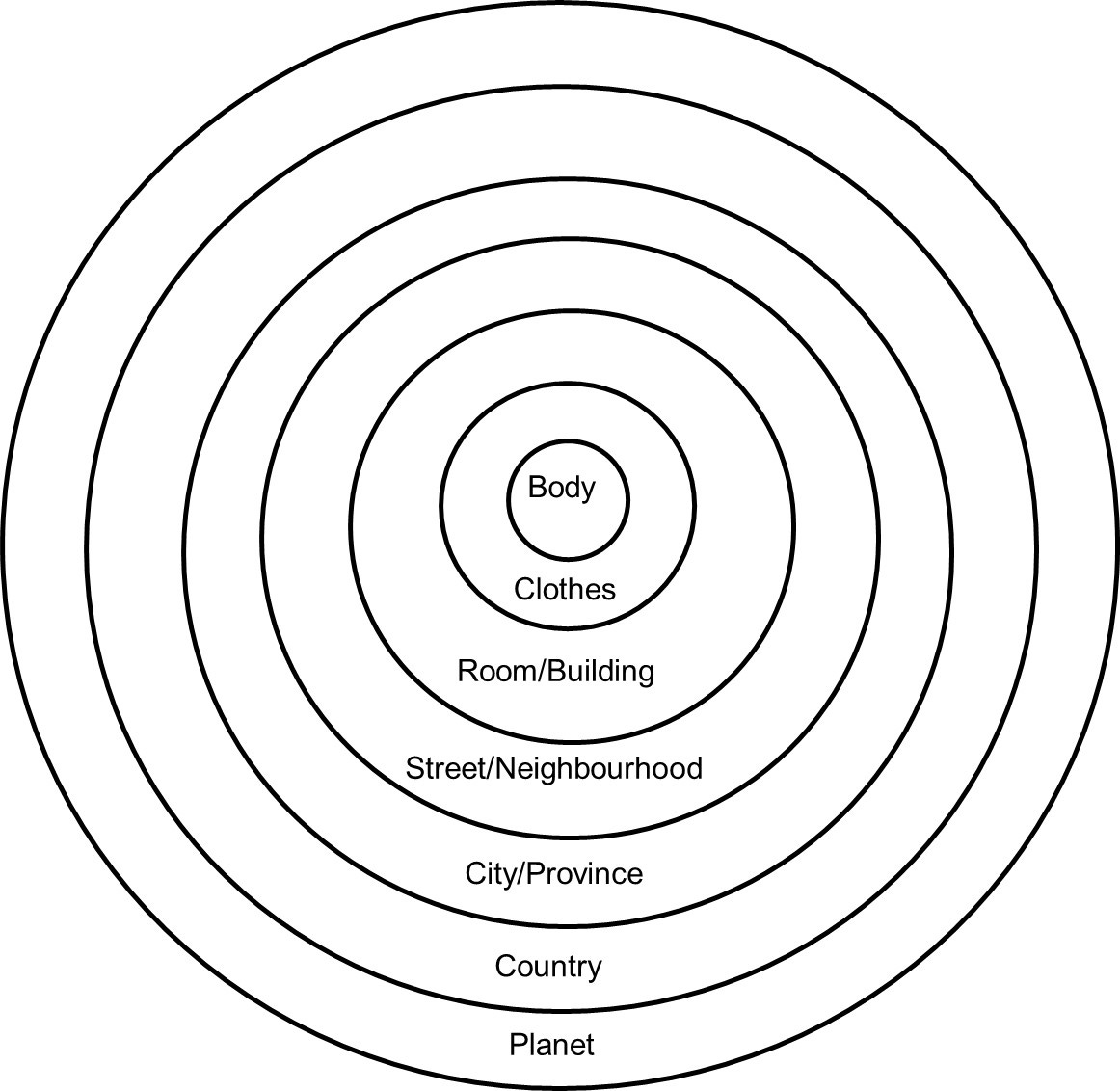Home is a Set of Concentric Circles
Rippling out from oneself
Home is a set of concentric circles which ripple out from one's body. At least that's how I've been thinking about it this last year, since I came to the end of my five-year plan (study hard, get a degree, find a job) and found the rest of life waiting.
It's like this: beyond my body lie my clothes, beyond my clothes lie this room and the building it's a part of, beyond the building lie the street, the city, and so on; until one zooms out to the cosmos. Existence permits no choice - one must inhabit all these circles simultaneously. So clothes, streets, and cities are all places I’ve called home.
This might seem like a stretch - isn’t home just wherever one permanently stays?
That’s part of it, but I think this framing presumes too much, and misses why homes matter to begin with.
It presumes too much by asserting permanence as a coherent idea. In fact, permanence is an illusion which dissolves when one stretches timescales. I grew up in Durban, stayed in the same house for seventeen years - and for that period, it was my home. Since then though, Durban comprises only the first link in a chain of places I’ve lived; and it won’t be clear where that chain ends until I’m dead. So the idea of home as something fixed, something permanent, leaves me uneasy.
Framing home as just a building also ignores the concept’s emotional weight. I’m writing this in the thick of winter, from the room where I currently live. Right now I feel more connection to this tatty brown jacket - this bastion of comfort and warmth! - than I do to this cold apartment. It is a stranger’s apartment; owned by a woman I met only once, at a distance. She left behind wooden figurines, occupied picture frames, dated diaries. It’s where I stay for now, but it doesn’t feel much like home.
Which circle I feel I occupy depends on who’s asking. If you’re from my city, I’d tell you about home by reference to my neighbourhood. If you’re from another continent, it’s enough to say that home’s in Cape Town. If you’re from another planet, consider me a resident of earth.
So home is a flexible concept, one which operates on multiple scales. It is both more and less than just the building where one dwells.
There is a second way that home expands outwards from oneself - in relation to others. So it’s also like this: beyond my body lie the bodies of my nuclear and extended family, my community of friends, and whoever else I resonate with.
Such people make me feel comfortable and safe. They make me feel at home in their presence, regardless of where we are. This crystallized for me a few years ago, in a cabin at a mountain resort.
It was one of those rare winter weekends when, after weeks of coordination around who’d cook what, my mother’s clan convened. There were perhaps forty of us in all, spread across six or seven chalets. The space was generic and impersonal, and we weren’t there for long. Still, as I sat sandwiched between a dozen cousins (each of whom reminds me of a funhouse reflection, of people I might’ve been), drinking and sharing space, I felt at home. Here was a place I belonged.
Another scene I often think about played out in London, during my postgraduate studies. This was a few months before the pandemic began. I had joined my university’s ‘Society for the Application of Psychedelics’ and grown close to several of its members. One grey Saturday, we gathered for a picnic in the park, and afterwards, for a meal at someone’s shared apartment.
Unremarkable circumstances, sure, but the day felt special. Here were people drawn from across the globe (from Russia, France, Hong Kong, and more), people I had known for only a few weeks, who sparked in me the same sense of ease that my family did. Here were people who seemed to recognise who I was. Here was another place which felt like home.
I’ve had that same feeling even in spaces I’ve visited alone (like museums, parks, and parties), spaces that seemed to foster a sense of community and common purpose between strangers. So it makes sense to me that home is not just a space or a set of spaces, but also a feeling that flows from human connection; one that can arise anywhere, that can be felt even in spaces where one knows nobody else.
The first set of circles is universal, for one cannot help but occupy space. Although some people (like those currently experiencing homelessness) may not have a fixed address, they nevertheless exist somewhere, and so can be located within the bounds of my first figure. The second set of circles will look different for different people - if, for example, you don’t have a good relationship with your family members, they’re unlikely to feature here. Even so, I think the basic insight that certain people feel like home is one that holds true for almost everyone.
I like the idea that home is something that extends outwards from one’s self. It brings me comfort that, in the face of persistent change and uncertainty, as the details of my life shift in and out of focus, as I swim between eras and selves and roles (as a son, an employee, a partner, etc.); as all this changes thrums in the background, I will always be at home. I will not be uprooted.




